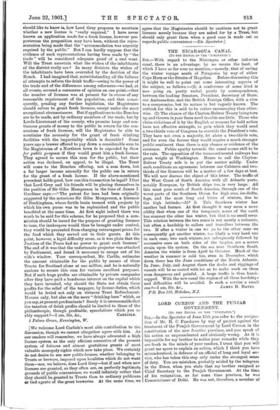THE NICARAGUA CANAL.
(To TER EDITOR OP TUE "SPECTATOR:1
Snr,—With regard to the Nicaragua or other isthmian canal, there is an advantage, by no means the least, of which I have so far seen no mention,—namely, that of saving the winter voyage south of Patagonia by way of either Cape Horn or the Straits of Magellan. Before discussing this it might be well to point out some interesting aspects of the subject, as follows :—(1) A conference of some kind is now going on, partly verbal, partly by correspondence, between the leading Senators. President, Secretary of State, our Ambassadors, and the British Foreign Office, with a view to a compromise, but its nature is but vaguely known. The outlook for this is said to be rather encouraging than other. wise. (2) The chance of the Clayton-Bulwer Treaty being torn up and thrown in your faces need trouble one little. Those who claim violations of it by the English as reasons for bold action have not effective strength, to gain which they would need a two-thirds vote of Congress to override the President's veto. They have not even a majority, let alone a two-thirds vote, and for even the former they would require a much stronger public sentiment than there is any chance or evidence of the existence. Public apathy towards the canal seems still to be the rule. The opposition of the transcontinental railways has great weight at Washington. Hence to call the Clayton- Bulwer Treaty safe is to put the matter mildly. Under such conditions an agreement between our Cabinets and two- thirds of the Senators will be a matter of a few days at best. We will now discuss the object of this letter. The traffic of the West Coast of South America with all Atlantic ports, notably European, by British ships too, is very large. All this must pass south of South America, through one of the worst parts of the Southern Ocean for high seas, ice-drifts, fogs, and the most long and bitter of winters, due to the high latitude,-55° S. This Southern winter hae another bad feature. At first thought it may seem a mere oddity that when one of the temperate zones of the earth has summer the other has winter, but that is no small error. This relation between the two zones is not merely a nuisance, but often a hardship to sailors and travellers between the two. If after a winter in one we go to the other zone we consequently get another winter, too likely a very hard one in each case; two such winters, not infrequently followed by successive ones on both aides of the tropics, are a severe strain upon the system. On the sea near Southern South America the winter is from April to October. Much of the weather in summer is cold too, even in December, which down there has the June conditions of the North Atlantic. In June, July, and August there the decks and riggings of vessels will be so coated with ice as to make work on them even dangerous and painful. A large traffic is thus handi- capped. With the new canal the region of all these hardships and difficulties will be avoided. Is such a service a small one ?—I am, Sir, &c., JAMES H. BATES. P.O. Box 118, Hoboken, NJ.










































 Previous page
Previous page